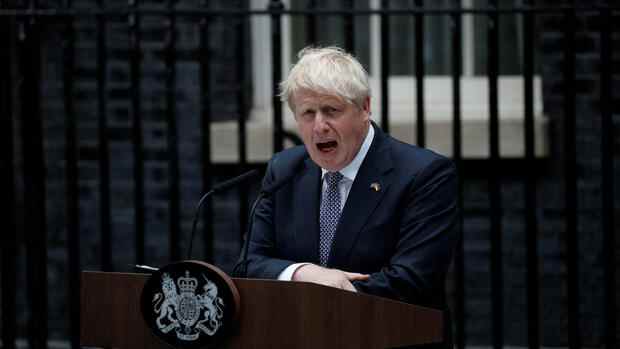The British Prime Minister announces his resignation as party leader at 10 Downing Street in London.
(Photo: Reuters)
London British Prime Minister Boris Johnson has announced his resignation as leader of the Conservative Party. At the latest after the election of a successor, he would also be rid of the office of prime minister. But he wants to continue as head of government until the election, Johnson said on Thursday. “I want you to know how sad I am to be leaving the best job in the world.”
Almost 50 members of the government had previously resigned in protest at Johnson’s leadership style, including on Thursday morning the new Minister of Education Michelle Donelan, who was only appointed on Tuesday. Half of the cabinet revolted against the prime minister, and Finance Minister Nadhim Zahawi, who had just been appointed by Johnson, publicly called on the 58-year-old head of government to resign.
As a result, Johnson no longer had any allies in his political struggle for survival. This was preceded by days of chaos that even the British, used to political dramas, had not experienced for a long time.
Only yesterday Johnson had shown himself combative in Parliament and announced that he would continue. When he was urged by several cabinet members on Wednesday evening to clear the way for a successor, he remained stubborn.
Top jobs of the day
Find the best jobs now and
be notified by email.
Only when Zahawi publicly distanced himself from the prime minister did Johnson give up. “The country deserves a government that is not only stable but also acts with integrity. Prime Minister, you know in your heart what is right and go now,” the Conservative Chancellor of the Exchequer wrote in a letter to the PM published on Twitter.
But that’s not the end of the drama in London. Johnson wants to remain in office until his successor is elected. And that could last until the fall. According to reports, Johnson even wants to announce an interim cabinet to close the gaps filled by the wave of resignations. However, many Conservative MPs apparently refuse to enter the government under Johnson’s leadership.
So far, only Attorney General Suella Braverman and Brexit supporter Steve Baker have hinted at their candidacy to succeed Johnson as the Tories’ party leader.
>> Read here: Johnson before resigning – how things are going in London now
However, it is expected that the race to succeed Johnson will not really begin for the next few days. The party’s internal election campaign is likely to drag on for a few weeks. In any case, a new party leader and prime minister should be found by the party conference in early October.
However, it is questionable whether Johnson will be able to remain in office as acting prime minister for that long. Economics Minister Kwasi Kwarteng, who had previously resigned, called for a successor plan on Twitter “as soon as practically possible”. Former Schools Minister Nick Gibb also demanded that Johnson immediately resign as Prime Minister.
The influential “1922 Committee” of the Conservative Party decides on the timetable for the successor. Should Johnson not get his wish through, his previous deputy Dominic Raab would probably lead the business until a new prime minister was elected. However, the Attorney General remained loyal to Johnson to the end.
Johnson apparently decides to resign
Several cabinet members are considered potential successors. Secretary of State Liz Truss reportedly cut short a trip to Indonesia and headed back to London. She is considered one of the most promising candidates. According to a recent poll, British Defense Secretary Ben Wallace seems to be the favorite within the Conservative party.
The opposition, meanwhile, was pleased with the reports of the impending resignation. This is “good news for the country,” said Labor Party leader and opposition leader Keir Starmer. “We don’t need a change in Tory leadership – we need a real change of government,” Starmer said. “We need a fresh start for Great Britain.” At the same time, he threatened a vote of no confidence in the cabinet if Johnson did not leave his post immediately.
The withdrawal reports also impacted the financial markets. The British pound initially reacted to the report with price gains. Against the dollar, the pound gained about 0.5 percent to $1.1991. The currency hit a two-year low against the dollar at 1.185 on Wednesday following the resignation of senior ministers.
British share prices also climbed. The benchmark FTSE 100 index, which usually benefits from a weaker pound, was up 1.1 percent around noon Central European Time despite a firm British currency.
More: Why Britain is the Sick Man of Europe
